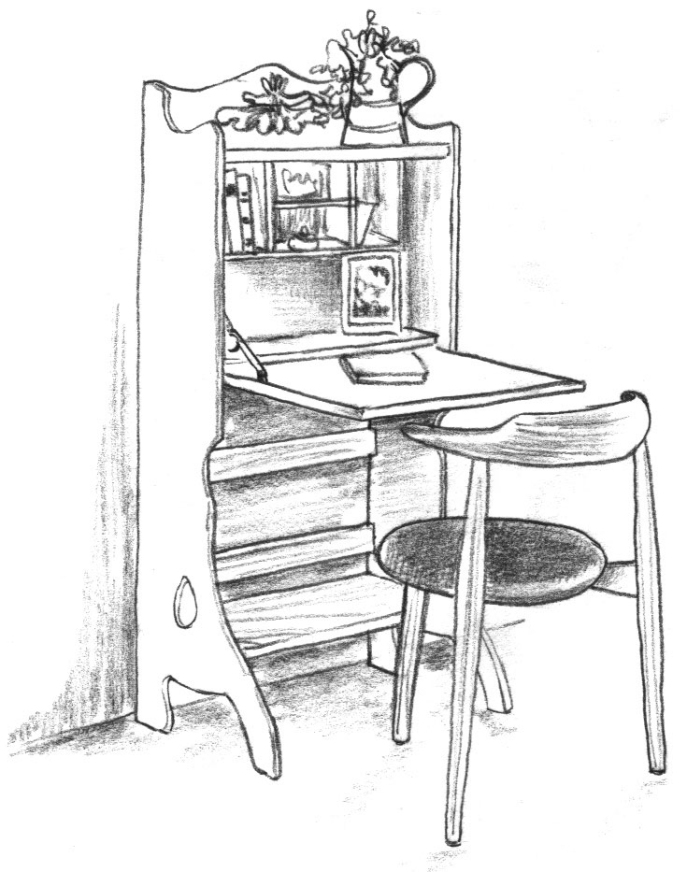
The Larkin by Chuck Thurston
My mother loved auctions. She never spent much, but usually came back with an item or two — a cut glass sugar bowl, a salt and pepper shaker set, perhaps a chair or hassock — if it would fit in her car.
Although she often talked of the shrewd maneuvers she had made to get her prize, I don’t think it was the anticipation of finding a bargain at these events, so much as it was the social experience that drew her to them. She was a farm wife with a large family — five boys and a husband — and the auctions were a pleasurable diversion from her busy life.
I was 10 to 12 years old when she brought home a small writing desk that we put in my upstairs room in a corner of the large old farmhouse. I doubt that she paid more than a few dollars for it. It was dark from many coats of varnish or shellac applied over the years, but I loved it immediately.
it was solid oak with elaborate carvings on the top and a drop front writing surface. It had several pigeonholes for keeping a small boy’s treasures, and was even lockable — although the key was long gone. I spent many hours doing my homework on it.
Eventually I moved on in life — the military, marriage, a family, a job and a move several states away. A brother took over the old farm to raise beef.
A lifelong bachelor, he didn’t need that much space in the big house and a few years ago he mentioned that my little desk was still in my unused old room; he would be glad to haul it down and put it in my vehicle on my next visit.
Within a few weeks, my wife and I were looking it over. It was dirty from the dust and grime of many years, but we brought it home. Even a thorough cleaning didn’t seem to improve it much, so we parked it out of sight in a spare room.
When we built our cabin, we decided to see if it might work out there. We didn’t want to spend a lot of money on it, but I found a furniture restorer in the area, put the desk in the back of my van and ran it over to her. She came out of her house to look at it, and when I lifted the rear van gate said, “You have a Larkin! “And,” the lady assured me, “they are quite collectable now!”
Hmmm…that put a little different spin on things.
I had no idea what she was talking about, but did a little research. Around the turn of the 19th century, the Larkin Soap Company awarded small pieces of furniture like this as premiums for the purchase of their soap products. Ten dollars worth of soap got you a little writing desk.
When I picked it up after restoration, it was as the lady had promised — a beautiful honey-oak underneath all the layers. A few loose joints were repaired and some new brass fittings were added. We moved it to the cabin and placed it proudly along an interior wall, with a small chair from my wife’s own childhood. The two pieces looked as if they had been waiting all their furniture lives for this mating.
That would have been a happy enough ending, but a few years ago, we were approached by one of those slick coffee-table magazines planning on doing a feature story on cottages and small cabins. Could they do a photo-shoot of ours for this issue? We certainly qualified as small.
On a nice spring day, they brought their cameras and lights and computers and went to work. We hustled to stay out of their way as they took dozens of shots. They promised us proofs of the pictures they took, and three weeks later these arrived in the mail.
We have always taken our little cabin’s appeal more or less for granted and have been flattered, but always a little bit surprised, when others commented on it. Now we saw it almost as if for the first time — as captured by a professional photographer.
And in many of the pictures, standing in its quiet corner is our little writing desk. Warm, functional, dignified. Originally gotten for soap coupons, moved from place to place, over-painted, bought at auction with egg money when someone’s household dissolved, and neglected in a dark, unheated room of an old farmhouse for decades — its time come again at last.
We don’t miss many opportunities to show it to visitors and to point out, “It’s a Larkin!”
“The Larkin” is one of the stories in Chuck Thurston’s book “Senior Scribbles Unearthed” – available on Amazon.
